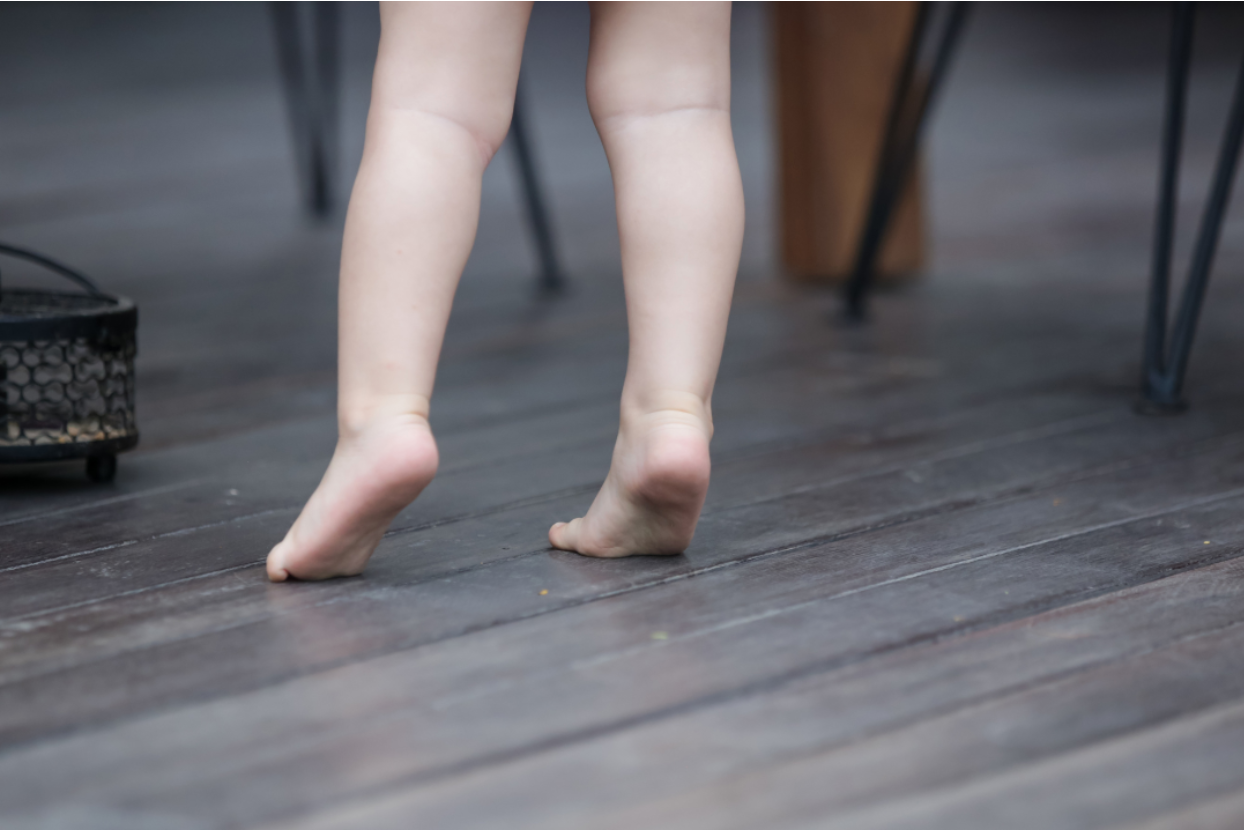
Jump to section
Kids can start walking on their toes from a very young age, even just shortly after they’ve mastered confidently walking and balancing
on their own. This can raise alarm bells for many parents regarding the potential reasons behind their child’s toe walking, and
whether it’s normal or could be a sign of an underlying problem.
Toe walking is defined as bearing weight only on their forefeet and toes for prolonged periods, without having any contact with their heels on the floor. With the majority of the body weight being taken by the forefoot with every step, it’s not thought of as the most comfortable or natural type of gait.
There are several causes of toe walking, with the most common category being ‘idiopathic toe walking’, which is
typically the diagnosis given when all other explanations and causes (like neurological causes) have been ruled out. In a portion of these
cases, the reason why the cause is unknown is that there isn’t anything ‘medically’ wrong - an adventurous and developing
child is simply exploring a new walking pattern that they may perceive as fun, and they enjoy doing it. Sometimes, this may last for a short
time. Other times, it can become a long standing habit.
Other known causes of toe walking include:
As a regular heel-to-toe walking pattern tends to develop by the age of 22 months, if consistent toe walking is persisting beyond two years old, we’d recommend bringing your child in for an assessment. This will allow us to perform a series of tests (including evaluating your child’s gait pattern, muscle tone and strength, looking for signs of any neurological deficits and the like) in order to better understand the cause behind your child’s toe walking, and either make a treatment plan to help support them, or refer them appropriately if an undiagnosed medical condition is suspected or worth investigating further.
While it’s much less common to begin toe walking in adulthood, it can occur for several reasons:
Here at The Feet People, we always take the time to carefully assess and diagnose toe walking, knowing that it can be linked to serious underlying medical conditions where early detection can lead to the best management outcomes.
Every appointment begins with a comprehensive assessment, the results of which guide your management plan entirely. Your care with us may include:
Can toe walking be a sign of autism?
Toe walking can sometimes be associated with autism spectrum disorders (ASD). While not all children with ASD engage in toe walking, studies have shown a higher prevalence of toe walking among children on the autism spectrum.
Will my child outgrow toe walking on their own?
Some children may naturally outgrow toe walking without any intervention. However, if toe walking persists beyond the age of 2 years, it is recommended to have your child assessed. Early identification and intervention can help address any underlying issues and promote more typical walking patterns.
Are there any exercises or stretches that can help with toe walking?
Physical therapy exercises and stretches can be beneficial in addressing toe walking. These may focus on stretching tight calf muscles, strengthening weak muscles, and promoting proper foot and ankle alignment. These are typically prescribed on a case-by-case basis depending on the underlying cause of the toe walking.
Can toe walking affect my child's balance and coordination?
Persistent toe walking can potentially impact a child's balance and coordination. Walking on the toes alters the natural alignment of the foot and can affect stability, leading to challenges with balance. Addressing toe walking through appropriate interventions can help improve balance and coordination.
Will my child need surgery to correct toe walking?
Surgery is generally not the first-line treatment for toe walking, with most cases of toe walking can be effectively managed through non-surgical interventions like the ones we’ve mentioned above. Surgery is considered in rare cases when conservative measures have been unsuccessful, and there are specific structural abnormalities that require surgical correction. This option should only be explored after other options have failed to yield adequate results.
| Monday | 7:40am - 6:00pm |
| Tuesday | 7:40am - 6:00pm |
| Wednesday | 7:40am - 6:00pm |
| Thursday |
7:40am - 6:00pm |
| Friday | 7:40am - 2:00pm |
| Saturday | CLOSED |
| Sunday | CLOSED |
Ground Floor, 344 Queen Street,
Brisbane City QLD 4000
| Monday | 7:40am - 6:00pm |
| Tuesday | 7:40am - 6:00pm |
| Wednesday | 7:40am - 6:00pm |
| Thursday |
7:40am - 6:30pm |
| Friday | 7:40am - 5:00pm |
| Saturday | 7:40am - 4:30pm |
| Sunday | CLOSED |
Newmarket Village, 114/400 Newmarket Rd, Newmarket QLD 4051